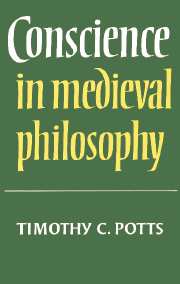2 - Philip the Chancellor
Published online by Cambridge University Press: 06 January 2010
Summary
The first treatise on conscience, which set the pattern for subsequent ones, was written by Philip the Chancellor about 1235. Philip deals primarily with synderesis and only secondarily with conscientia. He poses four questions; conscientia does not make its appearance until the third, in which it is distinguished from synderesis. A modern reader is not likely to make much of the first two questions – whether synderesis is a potentiality or a disposition, and how it is related to reason – until he has some grasp of Philip's distinction between synderesis and conscientia, so we need to go straight to his discussion of the third question.
It is set out in the usual scholastic form: arguments that synderesis can lead us to do wrong, arguments that it cannot, discussion and, finally, replies to or comments upon the initial arguments. The first argument to show that synderesis can sometimes lead us astray begins: ‘Conscientia is sometimes mistaken, sometimes right. But in whatever power there is any mistake over what is to be done, in that power there is sin’ (Translations, p. 102). Well, then, Philip continues, citing Jerome, synderesis is the same as conscientia; so synderesis can lead us to do wrong.
- Type
- Chapter
- Information
- Conscience in Medieval Philosophy , pp. 12 - 31Publisher: Cambridge University PressPrint publication year: 1980



